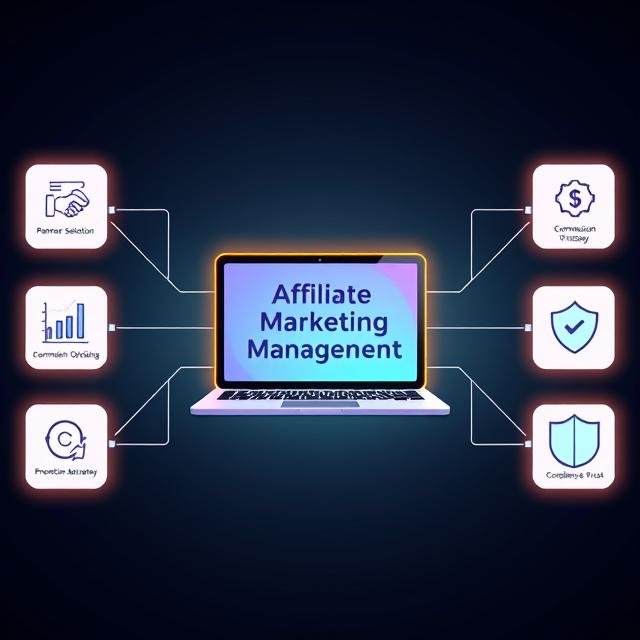
Mastering the Art of Affiliate Marketing Management: Tips and Strategies for Success
Affiliate marketing management is the process of overseeing and optimizing the performance of an affiliate marketing program. This involves recruiting and managing a network of affiliates who promote a company’s products or services in exchange for a commission on sales or leads. The affiliate marketing manager is responsible for developing and implementing strategies to attract and retain high-performing affiliates, as well as tracking and analyzing the performance of the program to ensure its success.
Affiliate marketing management also involves establishing and maintaining relationships with affiliates, providing them with the necessary resources and support to effectively promote the company’s products or services. This may include creating marketing materials, offering incentives, and providing ongoing communication and support. Additionally, the affiliate marketing manager is responsible for monitoring the performance of affiliates, tracking sales and leads, and ensuring that commissions are accurately calculated and paid out in a timely manner.
The Benefits of Affiliate Marketing Management
There are numerous benefits to implementing effective affiliate marketing management. One of the primary benefits is the ability to leverage the reach and influence of a network of affiliates to drive sales and leads for a company’s products or services. By partnering with affiliates who have established audiences and strong promotional capabilities, companies can expand their reach and increase their sales potential.
Another benefit of affiliate marketing management is the ability to effectively scale a company’s marketing efforts without incurring significant upfront costs. Instead of investing in traditional advertising channels, companies can leverage the performance-based nature of affiliate marketing to only pay for actual sales or leads generated by affiliates. This can result in a more cost-effective and efficient marketing strategy.
How to Choose the Right Affiliate Marketing Management Platform
When choosing an affiliate marketing management platform, it’s important to consider several key factors. First, it’s essential to look for a platform that offers robust tracking and reporting capabilities. This will allow you to accurately monitor the performance of your affiliates, track sales and leads, and calculate commissions. Additionally, look for a platform that provides comprehensive affiliate management tools, such as the ability to recruit, onboard, and communicate with affiliates, as well as provide them with marketing materials and support.
It’s also important to consider the scalability and flexibility of the platform. Look for a solution that can accommodate the needs of your affiliate program as it grows, and that offers customizable features to meet your specific requirements. Additionally, consider the level of support and training provided by the platform, as well as any additional features or integrations that may be beneficial for your affiliate marketing program.
Tips for Successful Affiliate Marketing Management
To effectively manage an affiliate marketing program, it’s important to implement a few key strategies. First, it’s essential to establish clear goals and objectives for your program, as well as a solid understanding of your target audience and market. This will help you to effectively recruit and onboard affiliates who are aligned with your brand and can effectively promote your products or services.
Additionally, it’s important to provide ongoing support and communication to your affiliates. This may include providing them with marketing materials, offering incentives for high performance, and maintaining regular communication to ensure they have the resources and support they need to succeed. It’s also important to regularly monitor and analyze the performance of your affiliates, track sales and leads, and optimize your program based on data-driven insights.
Key Metrics to Measure the Success of Affiliate Marketing Management
There are several key metrics that can be used to measure the success of an affiliate marketing program. One of the most important metrics is conversion rate, which measures the percentage of visitors who take a desired action, such as making a purchase or submitting a lead form. Additionally, it’s important to track the average order value, which measures the average amount spent by customers referred by affiliates.
Another important metric is the return on investment (ROI) of your affiliate marketing program. This measures the revenue generated from your program compared to the costs associated with running it, providing insight into its overall effectiveness. Additionally, it’s important to track the lifetime value of customers acquired through your affiliate program, as well as the retention rate of customers referred by affiliates.
Common Challenges in Affiliate Marketing Management and How to Overcome Them
There are several common challenges that can arise in affiliate marketing management. One challenge is recruiting and retaining high-performing affiliates who are aligned with your brand and can effectively promote your products or services. To overcome this challenge, it’s important to clearly communicate the value proposition of your program, provide attractive incentives, and offer ongoing support and resources to your affiliates.
Another common challenge is accurately tracking and attributing sales and leads generated by affiliates. To overcome this challenge, it’s important to implement robust tracking and reporting capabilities, as well as establish clear guidelines for how sales and leads should be attributed to affiliates. Additionally, it’s important to regularly monitor and analyze the performance of your affiliates to identify areas for improvement and optimization.
The Future of Affiliate Marketing Management
The future of affiliate marketing management is likely to be shaped by advancements in technology and changes in consumer behavior. As technology continues to evolve, we can expect to see more sophisticated tracking and reporting capabilities, as well as increased automation and personalization in affiliate marketing programs. Additionally, as consumers become more discerning and selective in their purchasing decisions, we can expect to see a greater emphasis on building authentic relationships with affiliates and providing value-driven content and experiences.
Furthermore, we can expect to see continued growth in influencer marketing and content-driven affiliate programs, as well as an increased focus on diversity and inclusion in affiliate marketing management. As companies seek to reach new audiences and engage with diverse communities, we can expect to see more inclusive and representative affiliate programs that reflect the diversity of their target markets.
In conclusion, effective affiliate marketing management is essential for driving sales and leads for a company’s products or services through a network of affiliates. By implementing robust tracking and reporting capabilities, providing ongoing support and resources to affiliates, and measuring key metrics of success, companies can effectively manage their affiliate marketing programs. As technology continues to evolve and consumer behavior changes, we can expect to see advancements in affiliate marketing management that leverage automation, personalization, influencer marketing, and diversity and inclusion. By staying ahead of these trends and challenges, companies can position themselves for success in the future of affiliate marketing management.

